Dengue Fever Reaches Record Highs in 2024 Due to Climate Change
Dengue Fever Surges to Unprecedented Levels in 2024: The Worsening Impact of Climate Change
In 2024, dengue fever cases have soared to record levels, exacerbating public health concerns globally. This alarming spike underscores the complex interplay between climate change and the spread of vector-borne diseases, highlighting the urgent need for adaptive strategies and interventions.
Understanding Dengue Fever
Dengue fever is a mosquito-borne viral infection, primarily transmitted by the Aedes aegypti mosquito. The disease manifests with severe flu-like symptoms, and in some cases, can develop into a potentially lethal complication known as severe dengue or dengue hemorrhagic fever. With no specific treatment available, prevention and control rely heavily on effective mosquito management and community engagement.
The Role of Climate Change
Climate change plays a pivotal role in the increasing prevalence of dengue fever. Rising global temperatures, altered rainfall patterns, and urbanization create ideal breeding conditions for mosquitoes, facilitating the spread of the virus. Warmer temperatures can accelerate mosquito development, increase biting rates, and shorten the incubation period of the virus, thus enhancing transmission potential.
Moreover, extreme weather events linked to climate change, such as floods and hurricanes, can exacerbate the situation by disrupting public health infrastructure and increasing the risk of outbreaks. These environmental shifts are not only broadening the geographical range of dengue but also extending the transmission season in many regions.
Global Health Implications
The unprecedented rise in dengue cases in 2024 poses significant challenges for public health systems worldwide. Regions previously unaffected by dengue are now reporting outbreaks, placing additional strain on healthcare resources. The World Health Organization has emphasized the need for enhanced surveillance, vector control, and research into vaccines and treatment options to combat the growing threat.
Efforts to Mitigate the Impact
To address the escalating dengue crisis, coordinated global efforts are essential. Innovative solutions, such as the release of genetically modified mosquitoes and the use of Wolbachia-infected mosquitoes, are being explored to curb mosquito populations. Public health campaigns focused on community education and engagement are crucial in promoting preventive measures like eliminating standing water and using insect repellent.
Additionally, climate adaptation strategies must be integrated into public health planning, ensuring that communities are resilient to the health impacts of climate change. Investments in research and the development of a safe and effective dengue vaccine can also play a crucial role in mitigating future outbreaks.
As the world grapples with the dual challenges of climate change and infectious diseases, it is imperative to adopt a holistic approach that prioritizes both environmental sustainability and public health resilience. Addressing the root causes of the dengue surge in 2024 is not only vital for immediate disease control but also for safeguarding future generations against the growing threats posed by a changing climate.


